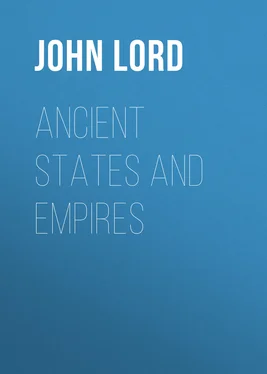John Lord - Ancient States and Empires
Здесь есть возможность читать онлайн «John Lord - Ancient States and Empires» — ознакомительный отрывок электронной книги совершенно бесплатно, а после прочтения отрывка купить полную версию. В некоторых случаях можно слушать аудио, скачать через торрент в формате fb2 и присутствует краткое содержание. Жанр: foreign_prose, История, foreign_edu, foreign_antique, на английском языке. Описание произведения, (предисловие) а так же отзывы посетителей доступны на портале библиотеки ЛибКат.
- Название:Ancient States and Empires
- Автор:
- Жанр:
- Год:неизвестен
- ISBN:нет данных
- Рейтинг книги:4 / 5. Голосов: 1
-
Избранное:Добавить в избранное
- Отзывы:
-
Ваша оценка:
- 80
- 1
- 2
- 3
- 4
- 5
Ancient States and Empires: краткое содержание, описание и аннотация
Предлагаем к чтению аннотацию, описание, краткое содержание или предисловие (зависит от того, что написал сам автор книги «Ancient States and Empires»). Если вы не нашли необходимую информацию о книге — напишите в комментариях, мы постараемся отыскать её.
Ancient States and Empires — читать онлайн ознакомительный отрывок
Ниже представлен текст книги, разбитый по страницам. Система сохранения места последней прочитанной страницы, позволяет с удобством читать онлайн бесплатно книгу «Ancient States and Empires», без необходимости каждый раз заново искать на чём Вы остановились. Поставьте закладку, и сможете в любой момент перейти на страницу, на которой закончили чтение.
Интервал:
Закладка:
The prophet Jeremiah pronounced his eulogy, and led the lamentations of the people for this great calamity, B.C. 608.
His successor.
The people proclaimed one of his sons, Shallum, to be king, under the name of Jehoahaz, but the Egyptian conqueror deposed him and set up his brother Jehoiakim as a tributary vassal. He reigned ingloriously for eleven years—an idolator and a tyrant.
Nebuchadnezzar wars against Judah. The fall of Jerusalem. Captivity of the Jews. Jeremiah.
In his days Nebuchadnezzar, king of Babylon, came up against him, having driven the Egyptians out of Palestine. Jehoiakim made his submission to the conqueror of Egypt, who now reigned over the whole Assyrian empire, but did not escape captivity in Babylon, with many other of the first men of the nation, including Daniel, and the spoil of Jerusalem. He was restored to the throne, on promise of paying a large tribute. He served the king of Babylon three years and then rebelled, hoping to secure the assistance of Egypt. But he leaned on a broken reed. A Chaldean army laid siege to Jerusalem, and Jehoiakim was killed in a sally, B.C. 597. His son Jehoiachin had reigned only three months when Nebuchadnezzar, a great general, came to carry on the siege in person. The city fell, the king was carried into captivity, with 10,000 of his subjects, among whom were Ezekiel and Mordecai, and only the poorer class remained behind. Over these people Nebuchadnezzar set up Zedekiah, the youngest son of Josiah, as tributary king. Yet even in this state of degradation and humiliation the Jews, wrought upon by false prophets, expected deliverance, against the solemn warnings of Jeremiah, who remained at Jerusalem. Zedekiah, encouraged by the partial successes of the Egyptians, rebelled, upon which the king of Babylon resolved upon the complete conquest and utter ruin of the country. Jerusalem fell into his hands, by assault, and was leveled with the ground, and the temple was destroyed. Zedekiah, in attempting to escape, was taken, had his eyes put out, and was carried captive to Babylon, together with the whole nation, and the country was reduced to utter desolation. It was not, however, repeopled by heathen settlers, as was Samaria. The small remnant that remained, under the guidance of Jeremiah, recovered some civil rights, and supported themselves by the cultivation of the land, and in their bitter misery learned those lessons which prepared them for a renewed prosperity after the seventy years captivity. Never afterward was idolatry practiced by the Jews. But no nation was ever more signally humiliated and prostrated. Can we hence wonder at the mournful strains of Jeremiah, or the bitter tears which the captive Jews, now slaves, shed by the rivers of Babylon when they remembered the old prosperity of Zion.
The character of the kings of Judah.
The Jewish monarchy ended by the capture of Zedekiah. The kingdom of the ten tribes had already fallen to the same foes, and even more disastrously, because the kings of Israel were uniformly wicked, without a single exception, and were hopelessly sunk into idolatry; whereas the kings of Judah were good as well as evil, and some of them were illustrious for virtues and talents. The descendants of David reigned in Jerusalem in an unbroken dynasty for more than 500 years, while the monarchs of Samaria were a succession of usurpers. The degenerate kings were frequently succeeded by the captains of their guards, who in turn gave way for other usurpers, all of whom were bad. The dynasty of David was uninterrupted to the captivity of the nation. And the kingdom of Judah was also more powerful and prosperous than that of the ten tribes, in spite of their superior numbers.
The ten tribes.
But it is time to consider these ten tribes which revolted under Jeroboam. Their history is uninteresting, and, were it not for the beautiful episodes which relate to the prophets who were sent to reclaim the people from idolatry, would be without significance other than that which is drawn from the lives of wicked and idolatrous kings.
Jeroboam. His wicked reign.
Jeroboam commenced his reign B.C. 975, by setting up for worship two golden calves in Bethel and Dan, and thus inaugurated idolatry: for which his dynasty was short. His son Nadah was murdered in a military revolution, B.C. 953, and the usurper of his throne, Baasha, destroyed his whole house. He, too, was a wicked prince, and his son Elah was slain by Zimri, captain of his guard, who now reigned over Israel, after exterminating the whole family of Elah, but was in his turn assassinated after a reign of seven years, B.C. 929. Omri, the captain of the guard, was now raised by the voice of the people to the throne; but he had a rival in Tibni, whom he succeeded in conquering. Omri reigned twelve years, and bought the hill of Samaria, on which he built the capital of his kingdom. But he exceeded all his predecessors in iniquity, and was succeeded by his son Ahab, who reigned twenty-two years. He was the most infamous of all the kings of Israel, both for cruelty and idolatry, and his queen, Jezebel, was also unique in crime—the Messalina and Fredigonde of her age. It was through her influence that the worship of Baal became the established religion, thus showing that the general influence of woman on man is evil whenever she is not Christian. And this is perhaps the reason that the ancients represented women as worse than men.
Elijah. Ahab.
It was during the reign of this wicked king that God raised up the greatest of the ancient prophets—Elijah, and sent him to Ahab with the stern intelligence that there should be no rain until the prophet himself should invoke it. After three years of grievous famine, during which he sought to destroy the man who prophesied so much evil, but who was miraculously fed in his flight by the ravens, Ahab allowed Elijah to do his will.
The destruction of the priests of Baal.
Thereupon he caused the king to assemble together the whole people of Israel, through their representatives, upon Mount Carmel, together with the four hundred and fifty priests of Baal, and the four hundred false prophets of the grove, whom Jezebel supported. He then invoked the people, who, it seems, vacillated in their opinions in respect to Jehovah and Baal, to choose finally, of these two deities, the God whom they would worship. Having discomfited the priests of Baal in the trial of sacrifices, and mocked them with the fiercest irony, thereby showing to the people how they had been imposed upon, Elijah incited them to the slaughter of these false prophets and foreign priests, and then set up an altar to the true God. But all the people had not fallen into idolatry; there still had remained seven thousand who had not bowed unto Baal.
Wrath of Jezebel.
Rain descended almost immediately, and Ahab departed, and told Jezebel what had transpired. Hereupon, she was transported with rage and fury, and sought the life of the prophet. He again escaped, and by divine command went to the wilderness of Damascus and anointed Hazael to be king over Syria, and Jehu to be king over Israel, and Elisha to be his successor as prophet.
War with Damascus. Curse upon Ahab.
Soon after this, Benhadad, the king of Syria, came from Damascus with a vast army and thirty-two allied kings, to besiege Samaria. Defeated in a battle with Ahab, the king of Syria fled, but returned the following year with a still larger army for the conquest of Samaria. But he was again defeated, with the loss of one hundred thousand men in a single day, and sought to make peace with the king of Israel. Ahab made a treaty with him, instead of taking his life, for which the prophet of the Lord predicted evil upon him and his people. But the anger of God was still further increased by the slaughter of Naboth, through the wiles of Jezebel, and the unjust possession of the vineyard which Ahab had coveted. Elijah, after this outrage on all the fundamental laws of the Jews, met the king for the last time, and pronounced a dreadful penalty—that his own royal blood should be licked up by dogs in the very place where Naboth was slain, and that his posterity should be cut off from reigning over Israel; also, that his wicked queen should be eaten by dogs.
Читать дальшеИнтервал:
Закладка:
Похожие книги на «Ancient States and Empires»
Представляем Вашему вниманию похожие книги на «Ancient States and Empires» списком для выбора. Мы отобрали схожую по названию и смыслу литературу в надежде предоставить читателям больше вариантов отыскать новые, интересные, ещё непрочитанные произведения.
Обсуждение, отзывы о книге «Ancient States and Empires» и просто собственные мнения читателей. Оставьте ваши комментарии, напишите, что Вы думаете о произведении, его смысле или главных героях. Укажите что конкретно понравилось, а что нет, и почему Вы так считаете.







